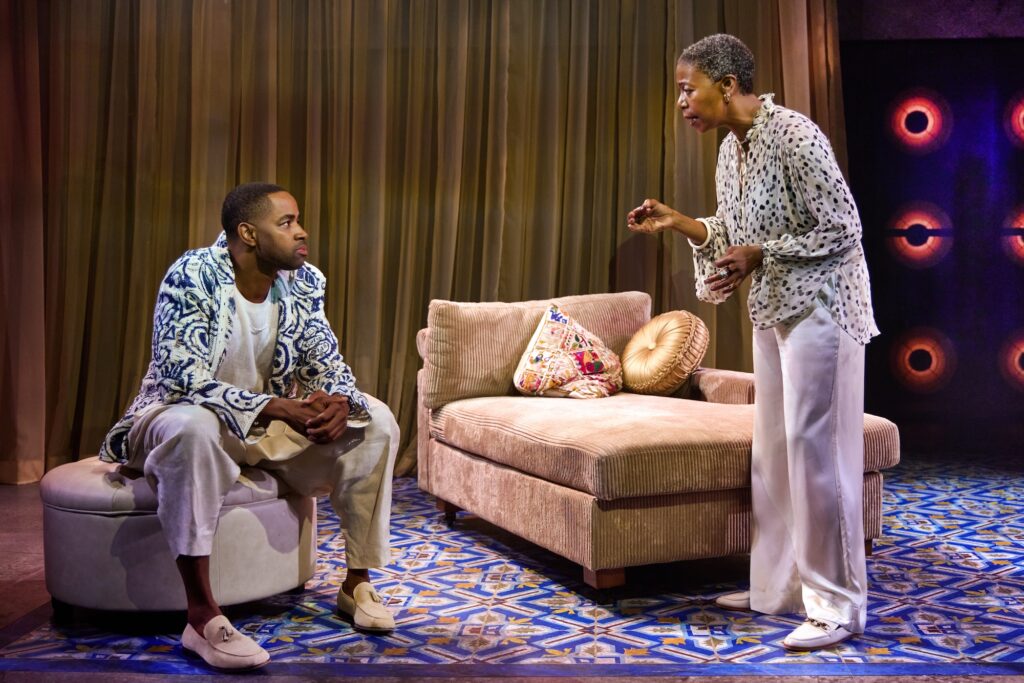Despite an Intriguing Premise, the Off-Broadway Play ‘Duke & Roya’ Offers Little Beyond the Obvious
While this production benefits greatly from the presence of actress Noma Dumezweni, it makes its points through often plodding dialogue that does a disservice both to its director, Warren Adams, and his game, accomplished cast.

An American hip-hop star and an Afghan interpreter meet cute in war-ravaged Kabul. The rapper, Duke, is immediately attracted to Roya, but she plays it cool at first: The youngest of four daughters, she is dedicated to helping her father, who works in the same field, and to empowering the vast majority of women in her country — her sisters included — who don’t enjoy the autonomy she has earned through hard work and, we’ll learn, a measure of deception.
It’s an intriguing premise, but “Duke & Roya,” a play by Charles Randolph-Wright now having its off-Broadway premiere, has little to say that isn’t obvious. And it makes its points through often plodding dialogue that does a disservice both to its director, Warren Adams, and his game, accomplished cast.
Mr. Randolph-Wright is perhaps best known as a director himself, his work having ranged from an excellent Broadway production of Alice Childress’s “Trouble in Mind” to “Delilah,” a short-lived television series for which he also served as an executive producer, alongside Oprah Winfrey. His various writing credits also include “Blue,” which has been a vehicle for distinguished performers such as Phylicia Rashad and Diahann Carroll.
This production of “Duke” benefits greatly from the presence of another duly celebrated actress, Noma Dumezweni, who has brought elegance, wit, and fire to an assortment of stage and screen roles. Here she plays Desiree, Duke’s mother, a British-Ghanaian divorcee and senior vice president at the World Bank who is every bit as posh and mannered as her name would suggest — though she is also, we discover in short order, warm, wise, and utterly devoted to her son.

It’s suggested that Duke’s lineage and upbringing have led to questions about his street credibility. (The late Tupac Shakur, whose own mother was a noted activist and who attended a prestigious arts school, faced similar skepticism despite enjoying less privilege than is implied here.) Roya, for her part, wonders why Duke, who talks vaguely about the challenges faced by young Black men, won’t use his platform to address more substantial issues.
When Duke informs Roya he’s about to release a second album, she quips, “So will this album be more talk about lifestyles, money, the requisite hos and gangsta energy?” Duke notes that he and his peers survive by “having a good time,” and tells Roya he wants to know more about her and her country; eventually his curiosity lands the budding couple off their secure base and in hot water.
“Duke” becomes more interesting when Mr. Randolph-Wright considers how gender dynamics in Roya’s culture have stymied women and men, in different ways. The heroine’s father, Sayeed, played by an immensely endearing Dariush Kashani, confesses that an arranged marriage has both deprived him of love and made it convenient to rationalize betrayal; later, he struggles to acknowledge how Roya’s experience has saddled her with desperate and seemingly impossible choices.
Even here, though, exchanges can be clunky or predictable, and the play grows hokier as it drifts further into rom-com territory. When Roya sheepishly admits to Duke that her name means “a dream” in Persian, he gushes, “A dream come true. True that!” At another point, he tells her, “I want you in my present, not my past,” and she responds, “Those are good lyrics.” Well, no, they’re not, unless you’re trying to simulate a musical Hallmark card.
As Duke and Roya, Jay Ellis and Stephanie Nur do the best they can with such platitudes. The winsome Ms. Nur in particular delivers a lovely, understated performance, capturing Roya’s shyness as well as her steel. If Mr. Ellis can seem relatively glib, that suits a celebrity who has grown self-protective and perhaps a little jaded, and his Duke is convincingly besotted with his new companion.
Not surprisingly, though, Ms. Dumezweni turns in the fiercest and funniest performance, despite Mr. Randolph-Wright’s stilted drawing of her character — Desiree seems at once too perfect and a little ridiculous — and looks smashing in suitably stylish costumes designed by Sanowber Sabrina Spanta. The actress and Mr. Kashani share the play’s most amusing and poignant scene, which both seasoned actors manage with polish and relish.
It’s too bad that “Duke & Roya” doesn’t offer its talented players, or the audience, more substance overall.

